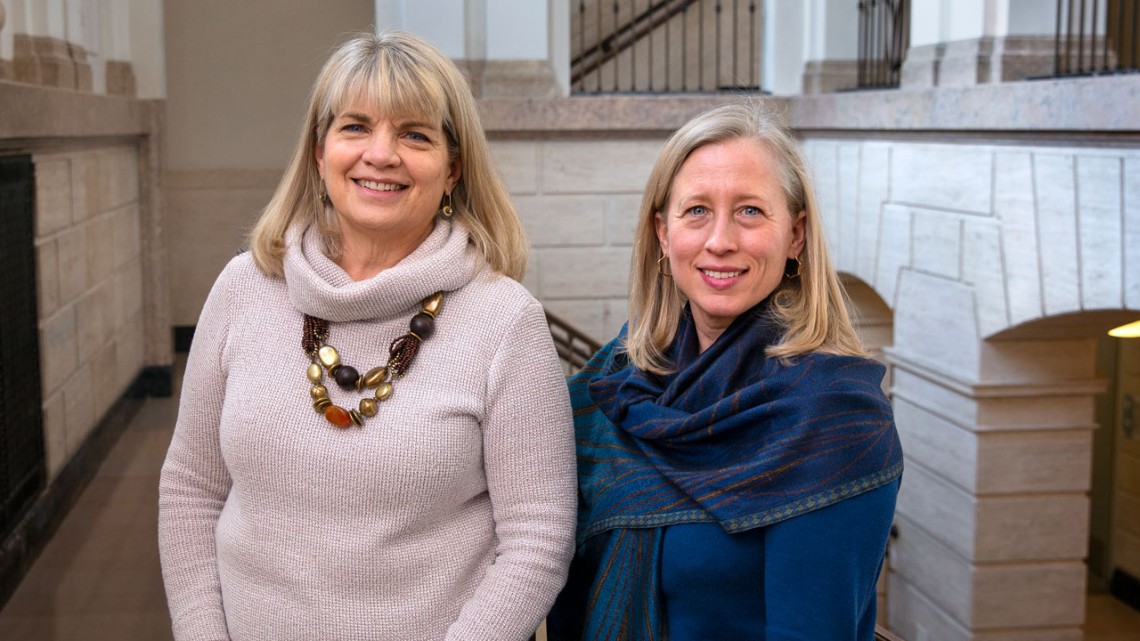
Deborah Streeter, left, faculty director of the Bank of America Institute for Women's Entrepreneurship at Cornell, and Kirsten Barker ’92, the institute’s program director.
Women’s entrepreneurship institute set for major expansion
By James Dean
Two years ago, the Bank of America Institute for Women’s Entrepreneurship at Cornell launched their certificate program delivered through eCornell. Demand for the program was so strong that the original goal of providing free online education to 5,000 entrepreneurs quickly increased to 20,000 – thanks to a follow-on grant from Bank of America – and seats in the program were filled as soon as they were added.
On Nov. 19 – Women’s Entrepreneurship Day – the bank announced an additional grant that will allow another major expansion, more than doubling total enrollment. The institute in the coming months will add another 30,000 seats – for a total of 50,000 – while continuing to emphasize diversity, including the development of a Spanish-language component.
“We at Cornell are extremely proud of the impact the Bank of America Institute for Women’s Entrepreneurship is having on aspiring entrepreneurs,” said President Martha E. Pollack. “The institute builds on Cornell’s commitment to the public good and on the strength of our faculty in providing practical, focused, accessible education.”
Bank of America will partner with nonprofits – including the National Urban League, the U.S. Hispanic Chamber of Commerce, the National Association for Latino Community Asset Builders and Prospera – to increase opportunities for Black and Latinx entrepreneurs. Those partners will offer their members access to the certificate program beginning in January 2021.
Already, more than 80% of the institute’s roughly 22,000 enrolled students identify as women of color. Registration is open to anyone worldwide, regardless of gender identity, educational background or business stage.
Students take a series of two-week online courses designed by Cornell faculty to help women develop and grow businesses, access resources and join a network of fellow entrepreneurs.
Instructors support students and moderate discussions in the six classes:
- Creating Your Venture;
- Laying the Legal Building Blocks;
- Assessing and Obtaining Financial Resources;
- Growth Leadership for Women Entrepreneurs;
- Product Development and Digital Marketing; and
- Communication, Negotiation and Persuasiveness.
“A human instructor is present in each course, so the students are receiving feedback on their course projects and in their discussion forums, as well as engaging and networking with each other,” said Kirsten Barker '92, program director for the institute.
Upon completing all six courses, students earn a certificate in women’s entrepreneurship – the only one of its kind offered by an Ivy League university. To date, students have completed nearly 21,000 courses and earned nearly 2,400 certificates.
Citing a study by the consulting firm McKinsey and Company, Bank of America noted that the coronavirus pandemic has more adversely impacted the careers of women, who accounted for 46% of U.S. employment before the pandemic but 54% of job losses this year.
At the same time, the institute’s leaders say, women, and specifically women of color, represent the fastest-growing segment in entrepreneurship, but historically have lacked access to training, resources and networks.
“We’ve been amazed by our students’ resilience throughout COVID-19,” said Deborah Streeter, the institute’s faculty director and Professor Emerita in the Charles H. Dyson School of Applied Economics and Management, part of the Cornell SC Johnson College of Business.
Responding to an institute survey about their transitions to working from home, students reported dealing with caregiving challenges that have disproportionately fallen on women, as well as disrupted businesses, longer hours in essential jobs and fatigue. Some also said they had found opportunities to bond with family and friends, expand their businesses online and improve efficiency.
After completing the program, one student proudly posted an image of her certificate to her LinkedIn page and stated “COVID-19 season has had a silver lining. I feel equipped and empowered.”
Having launched as an online certificate program serving students from across the nation – and a small international contingent representing dozens of countries – program leaders say the institute is well-positioned to grow and support more students despite the challenges posed by the pandemic.
“This expansion will allow us to improve the chances that these entrepreneurs will be successful,” said Stewart Schwab, the Jonathan and Ruby Zhu Professor of Law at Cornell Law School and executive director of the institute. “That’s our goal, to give our students the tools for success.”
Media Contact
Get Cornell news delivered right to your inbox.
Subscribe